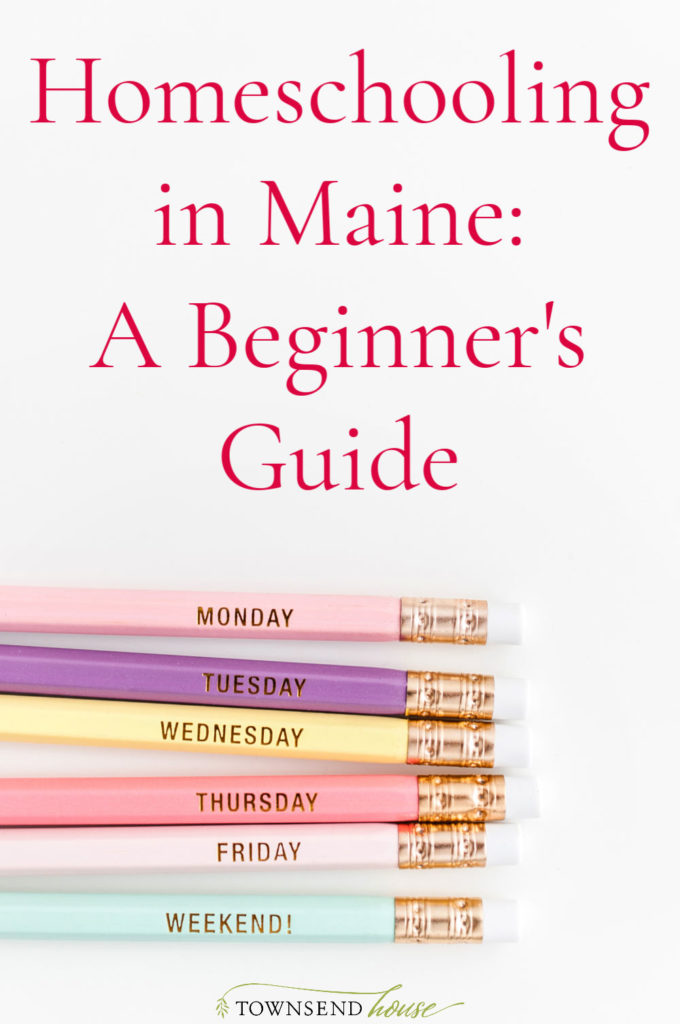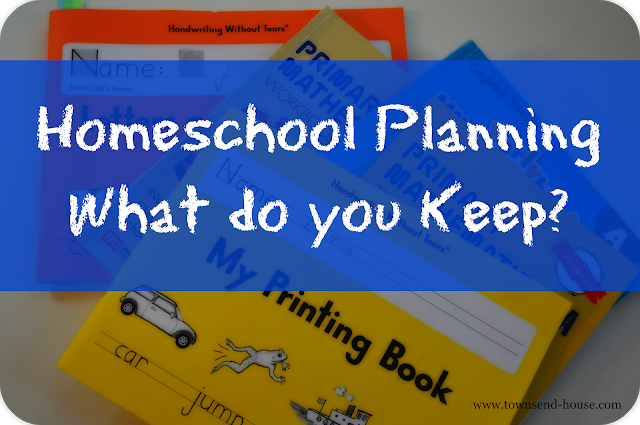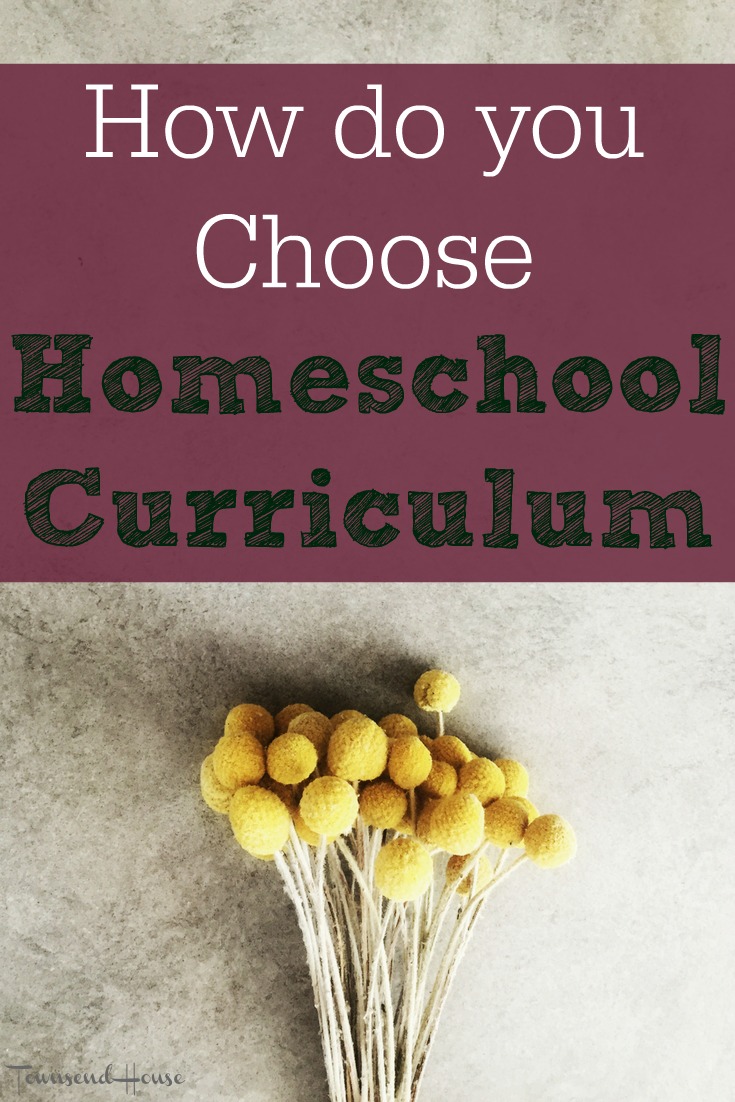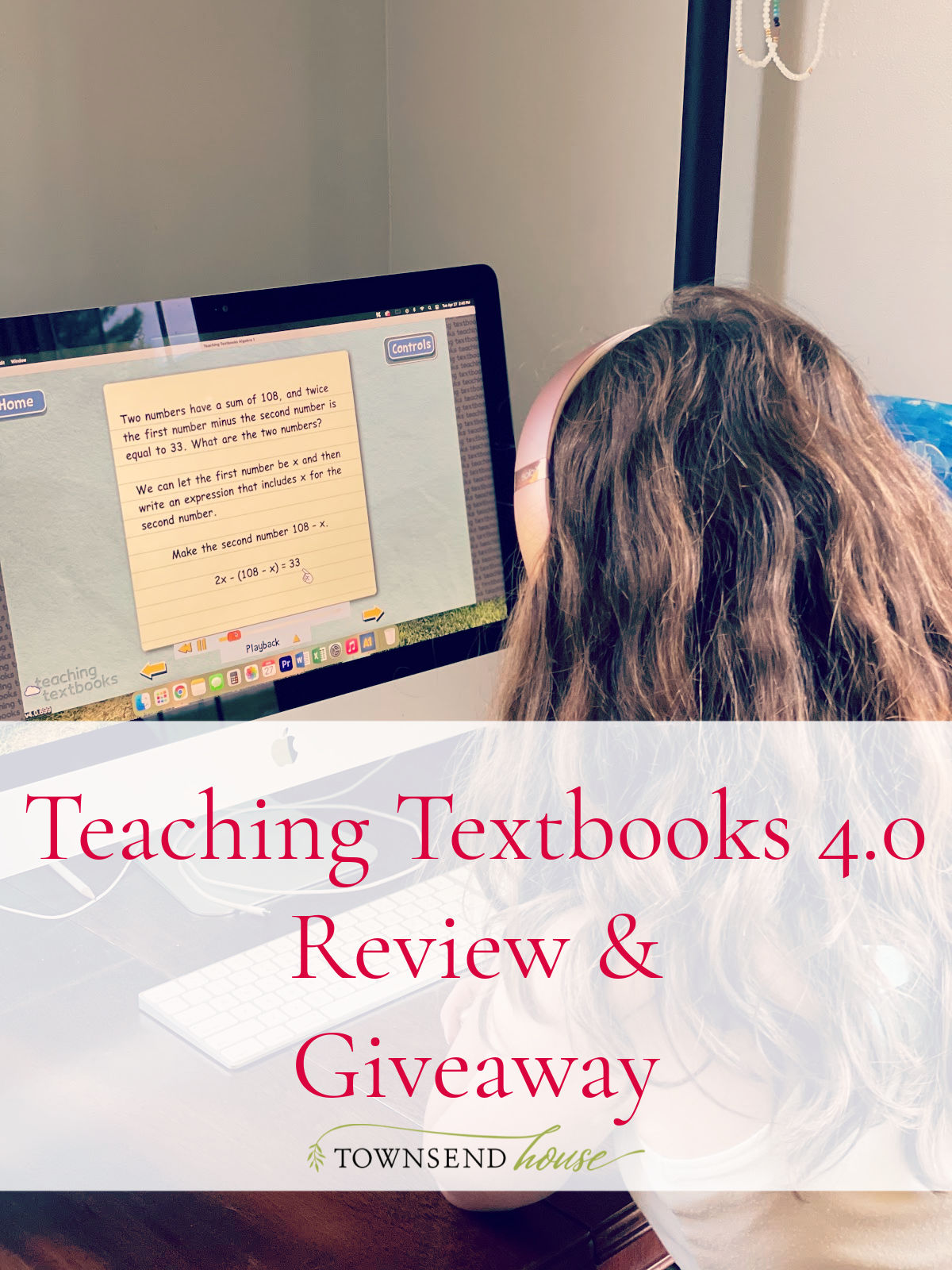How To Successfully Homeschool In Maine: A Guide
How do you start homeschooling in Maine? It is a common question, but it doesn’t need to be stressful! When I started homeschooling I had a lot of stress around the actual law – particularly the portfolio reviews. And I also didn’t have anyone that I knew locally to help me wade through the requirements – or the enormous amount of resources.
If that is you, you are in the right place!
Sign up for my How to Homeschool in Maine Workshop by clicking below!
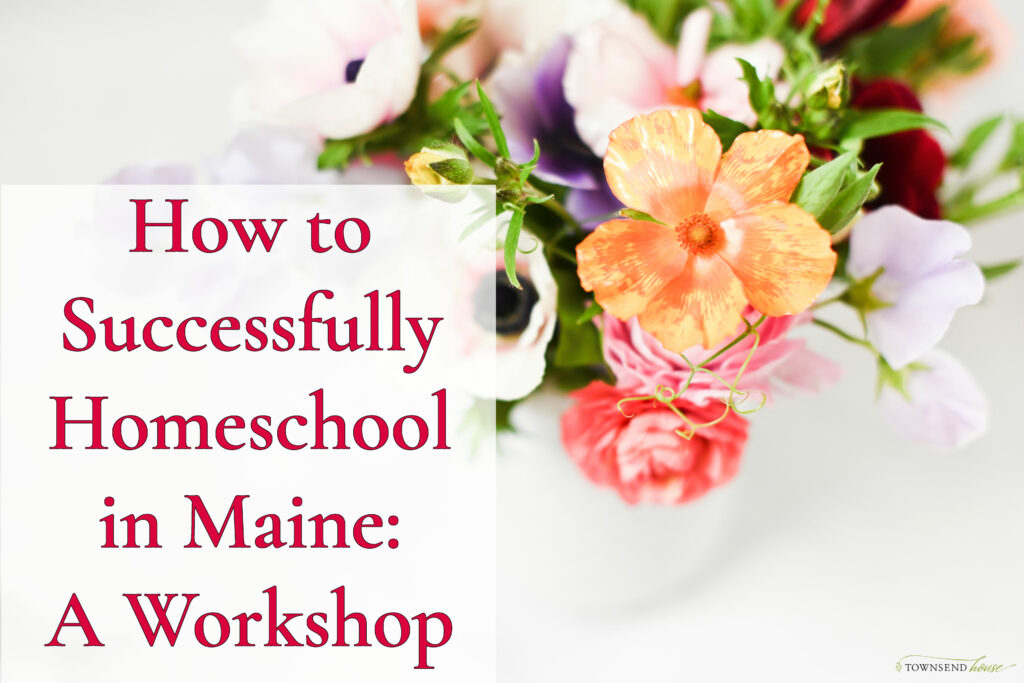
As soon as I started approaching that compulsory age (6-17), I was concerned. Are you doing everything right? What are the laws? What exactly does it mean to “make progress” in a subject? There were so many questions! I hope to alleviate some of that stress for you today!
Homeschooling in Maine: The Law
Disclaimer: I am not a lawyer. This is all based on my personal experience and not meant to be official legal advice. Please make sure you read the Homeschool Statute for the State of Maine. You can also find information at HSLDA.
Join the Townsend House Patreon Community by clicking below to get more help and encouragement on living a life you love as a homeschooler!

What exactly is the law in order to homeschool in Maine?
Compulsory Age
The compulsory age is when you have to start reporting to the state and your local superintendent. That means that from the ages of 6-17 your child needs to be in some sort of educational environment, whether that is public, private, or homeschool.
By your child’s 6th birthday, you must mail in a notice of intent. This means that if your child turns 6 on January 15th, you send the notice of intent to the local superintendent’s office and the Maine Department of Education by January 15th. The notice of intent is a letter that states you are going to be homeschooling your child. It is a notice, not an application. You do not apply or register to be a homeschooler in Maine.
If you need more help, please click here to set up a coaching session!
When your children have been in public school it is a little different.
- If you withdraw them in the middle of the year, you will need to send in the notice of intent within 10 days of withdrawing them to start homeschool instruction.
- If you do not plan to send them back to public school after you have completed a public school year, the notice of intent is due by September 1st.
- I would also let your local school know that you are withdrawing to homeschool – this isn’t required, but probably a good idea so they aren’t looking for your kid.
If you are not part of the Maine Homeschool Network Facebook Group, you can join by Clicking HERE.
Notice of Intent
The information required for your notice of intent is the following:
- The name, signature, and address of the parent providing homeschool instruction
- The name and age of the student
- The date the homeschool instruction program will begin
- A statement of assurance stating 175 days of homeschool instruction will be given in the required subject areas
- A statement of assurance stating that the homeschool instruction program will include an annual assessment
You can write your own letter of intent that includes the above mentioned items (there is no mandated form you must use). Homeschoolers of Maine also has forms that you can use here. You can also use the Maine DOE database to file a notice of intent, although it does not always work. I have never successfully used the DOE database. I recommend mailing a paper notice of intent certified mail, return receipt requested, so you receive the green card back stating they have received your paperwork.
Below is the address for the Maine Department of Education
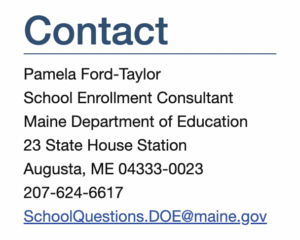
Homeschool Requirements: Course of Instruction
You do need to know that there are some standard requirements for homeschooling in Maine that you need to follow. However, these are quite flexible in how you complete them.
The first is that you spend 175 days of instruction in the following subject areas:
- English and Language Arts
- Math
- Science
- Social Studies
- Physical Education
- Health Education
- Library Skills
- Fine Arts
- in at least one grade from 6-12, Maine Studies
- at one grade level from 7-12, the student will demonstrate proficiency in computers
Now, the key to these subject areas and the number of days is that you do not need to teach each subject for 175 days. When I started homeschooling, I was trying to figure out how I could possibly teach my kids all of these subjects for 175 days each. Obviously, that isn’t realistic, and it isn’t required. And surprise, public schools do not do this either!
If this is your first year homeschooling, and your child did not turn 6 until the middle of the school year, you will not be required to do the 175 days of homeschool instruction in the first year.
Also, there is no hours requirement or mandate about when your child is doing “school.” So, for example, if you go to the Maine State Museum on a Saturday morning and do their treasure hunt throughout the whole museum, that would count as school. Even though it is a Saturday, you can count it as a school day. You are not required to be “doing school” from 8am-3pm Monday through Friday. How you plan your homeschool days is up to you.
Homeschooling in Maine Requirements: Annual Assessments
The other big part of homeschooling in Maine is to think about annual assessments. Now, annual assessments can sound extremely scary, but again, it doesn’t have to be.
You must provide a letter from a Maine certified teacher stating that your child has made progress in the above subject areas for the year after the teacher goes through your homeschool portfolio, and also that you have completed 175 days of instruction for the year. Alternatively, you can have your child take an annual assessment test (you can find options and where to purchase here – you need to be a member of the Maine Homeschool Network, just answer the questions so I can approve you!) and either provide those results to a teacher for them to observe the progress made, or send the results to your local superintendent’s office and Maine Department of Education. See more information at HSLDA about end of year assessments HERE.
This letter is in addition to the Subsequent Year Notice stating that you will be continuing to homeschool. The teacher letter and subsequent year notice are both due by September 1st to the Maine Department of Education and your local superintendent. Keep the original teacher letter or standardized test results and subsequent year notice in a file for your own records.
You must send both your end of year assessment AND your Subsequent year homeschool letter together by September 1st.
Homeschool Portfolios
I have an entire series on homeschool portfolios that you can look at. However, for our purposes, I will give a brief rundown on portfolios.
You must show progress in the different subject areas. This means that you must show progress from how your child was at the beginning of the school year to the end of the school year. It does not measure against a public school model. It does not measure against a specific standard of where that child “should” be. Instead, it is specific to your child.
If your child starts the year by reading short consonant-vowel-consonant words and then increases to more sight words at the end of the year, that is progress. If they don’t know their times-tables at the beginning of the year, but they do at the end, that is progress.
The best way to figure out what you need to put in your portfolio is to look for the teacher that you want to use before you need to do your portfolio review. They will be able to give you what their requirements are, and this will ease the burden for you when you start to put together your homeschool portfolio at the end of the year.
You can find a list of teachers available for review in the Maine Homeschool Network here.
Homeschooling in Maine
Now that we have the legal requirements out of the way, we can start on the more exciting stuff. What does it actually mean to get started homeschooling in Maine? Where do you start?
My advice would be to first read this post on How to get out of the Public School Mindset. When you start homeschooling, you revert back to your own school days. You think that you need to recreate the schoolroom, the desks with the school supplies. However, that is not necessary when it comes to homeschooling. Yes, having a nice space to homeschool is great, but homeschooling can happen anywhere.
This post includes affiliate links. If you click on one of these links and make a subsequent purchase I may receive a commission. Read Disclosure.
Understand that you have so many opportunities ahead of you for learning. You do not need to limit yourself in how you learn just because of how you learned growing up. A great resource for this is Julie Bogart’s The Brave Learner. She has a wealth of knowledge about bringing enchantment to learning, and she provides outside the box ideas.
Managing Your Homeschool Days
Making sure you have a plan is a priority for homeschooling. While it would be nice to fly by the seat of your pants, it isn’t realistic. That does not mean that you need to have a stringent plan in place with more textbooks than you know what to do with. Instead, it means that you need to know how you are going to teach, and what resources you want to use.
Understanding the many different methods of homeschooling is so incredibly helpful. There is everything from unschooling to classical education, and everything in between. I have a selection of books that I recommend which you can find here.
Homeschooling in Maine: Homeschool Planning
There are a couple of different options on how to plan. One of the great ways of homeschool planning is to do something called Planning from Behind. Essentially you are writing down all the activities that your child has done throughout the day, and then categorizing those activities in to the required subject areas.
I use an Erin Condren Teacher Planner to plan out our homeschool year. It allows me space to write out our lesson plans for the week, as well as space to do some planning from behind.
It is important to keep records so that you know what you have done for the year for your portfolio, but also to get a good grasp on how your year has gone overall.
Choosing Curriculum & Resources
The question that I get asked most often about homeschooling in Maine is what curriculum resources to use. When you ask that question in a Facebook group, you are going to get a wide variety of answers. The reason is that homeschooling doesn’t have standards the way public schools do. Each individual family is going to have standards, but in my experience no two families are the same.
What works for one family may not work for you. And what works for me may not work for you either. That is OK. There are so many options available, you will be able to find something.
The first thing you need to ask yourself when thinking about resources is how you plan to teach your kids. Do they have a particular learning style? What is your teaching style? You can find out more through my Homeschool Planning: Resources post.
Feel free to contact me directly if you want help with choosing resources for your homeschool year.
The Bottom Line
Homeschooling in Maine is really quite easy. Make sure that you have submitted your notice of intent. Create a planning strategy that works for your family. And most importantly have fun.
I know that everyone is super concerned about the education that they give their children. But, you have to remember to think outside of the box a bit. Homeschooling is not a public school. You do not need to plan to teach subjects in 50-minute blocks of time for 7 hours each day. Take the time to observe your children. What are they curious about? Answer all the questions that they come to you with. And what you don’t know, go search out together.
Homeschool Coaching & Consulting
I do offer Homeschool Coaching & Consulting if you are looking for more help please SET UP YOUR COACHING SESSION HERE and I will get back to you ASAP!
If you need any help, please either e-mail me or leave a comment below!
